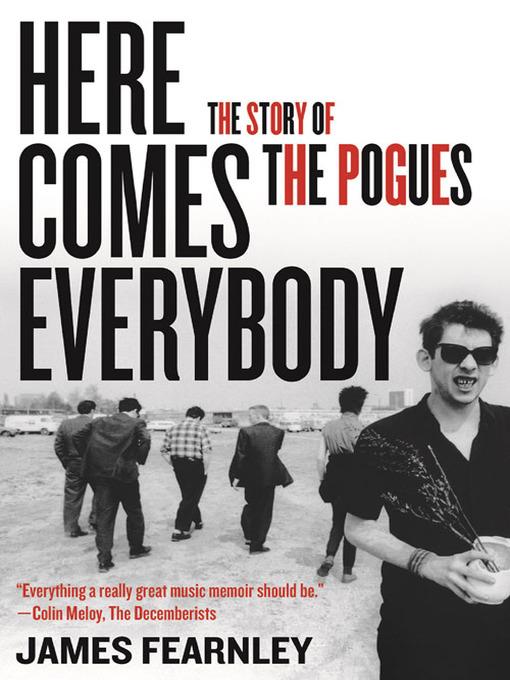
Here Comes Everybody
The Story of the Pogues
فرمت کتاب
ebook
تاریخ انتشار
2014
نویسنده
James Fearnleyناشر
Chicago Review Pressشابک
9781569760215
کتاب های مرتبط
- اطلاعات
- نقد و بررسی
- دیدگاه کاربران
نقد و بررسی

March 17, 2014
In the 1980s and ’90s the Pogues inspired an entire music genre—Celtic punk—with their combination of original punk-rock song mixed with traditional Celtic music played by British musicians celebrating their Irish heritage. Fearnley was an original member of the Pogues—short for “pogue mahone,” or “kiss my arse”—and his book is less a traditional history of its career then a relentlessly detailed and paced view of the band’s first nine years, from its formation in 1982 by Fearnley and lead singer Shane MacGowan to the band having to fire MacGowan in 1991 for his increasingly self-destructive behavior. Fearnley celebrates how MacGowan was the band’s fiery engine in its first years, a charismatic front man and songwriter whose “carriage, his contours, the attitude he copped, from which he did not break, were simultaneously authentic and artful.” But even while the band was achieving recognition and support from stars like Elvis Costello and Bob Dylan—and almost constant touring—MacGowan slipped into a haze of drugs and alcohol that Fearnley unflinchingly recounts. “I couldn’t understand how anyone could let himself become so bereft of responsibility for anything and yet write songs of such incisive beauty, full of chastening pity for the human condition.” Fans of the Pogues—which occasionally reforms and tours—will be moved by this brutally honest account of a still much beloved band.

March 15, 2014
A founding musician in one of Ireland's most raucous, poetic and punk bands remembers the highs, lows and plateaus of the golden age of combat rock. It's really only the first half of a continuing story, but it's the right half to tell. Fearnley just narrowly escaped becoming a permanent member of Culture Club when band mate Jem Finer invited him to become a member of The Nips, later changed to Pogue Mahone and then simply The Pogues. Led by the irreverent, inebriated and often diabolical singer Shane MacGowan, the band toured hard for a decade in the wake of their 1984 debut "Red Roses for Me." Fearnley makes readers feel every mile. For fans of the band, it's a detail-rich, expressive remembrance not only of the many gigs where someone had to pull MacGowan off the ceiling with a rake to get him to play, but also of the remarkable musical gumbo that produced fantastic songs like "If I Should Fall from Grace with God," "Rainy Night in Soho" and the holiday classic "Fairytale of New York," a duet with the late Kirsty MacColl. Along with fascinating glances at contemporaries like Elvis Costello and Joe Strummer, the book also offers a cleareyed and unforgiving assessment of MacGowan's path of self-destruction. "Shane's drinking was a more venerable enterprise, a swath cut by the likes of such writers as Brendan Behan and Dylan Thomas, not to mention Faulkner, Chandler, Fitzgerald and O'Neill," writes Fearnley. "More and more the question on people's lips was whether Shane wrote so beautifully because of the amount he drank, or despite it." But neither is the author afraid to point his insights at himself, relating his own struggles with music, women, drink and combat with his musical mates. Clearly, this talented musician has taken a page from Keith Richards' marvelous biography: Believe it or not, he remembers everything. Anyone who survived The Pogues deserves one last drink after the war.
COPYRIGHT(2014) Kirkus Reviews, ALL RIGHTS RESERVED.

May 1, 2014
In his author's note, Fearnley, the Pogues' accordionist, remarks that he used "the tools and sensibilities of a fiction writer" in constructing this memoir. Perhaps it's no surprise then that the title has a strong narrative arc, from the band's unlikely beginnings through its even more improbable rise to fame and culminating in the self-destruction and firing of lead singer Shane MacGowan. Though the group continued recording and touring for five years after MacGowan's departure, it's fitting that Fearnley's account cuts off after its final gig with the singer at the WOMAD (World of Music, Arts and Dance) festival in Japan in 1991. The author describes his edgy fellowship with MacGowan, as well as with the rest of the band, that lards the cycle of rehearsing, recording, and touring with narrative tension. While other personal events are covered--relationships, affairs, marriages, births, deaths--these are very much ancillary to the main thrust of the book, a close and intimate chronicle of artists who collectively found themselves on top of the world and were constitutionally incapable of staying there. VERDICT For Pogues fans (and folk-punk fans generally) and rock memoir aficionados; a fine example of the genre.--Genevieve Williams, Pacific Lutheran Univ. Lib., Tacoma
Copyright 2014 Library Journal, LLC Used with permission.

May 15, 2014
The Celtic punk band, the Pogues, is famous for many reasons, but two in particular stand out: distinctive melding of punk ferocity and traditional Irish music and jug-eared Shane MacGowan, its heavy-drinking, originally dentally-challenged front man. Founding member and accordionist Fearnley begins his entertaining and rollicking memoir as MacGowan is booted from the group as a result of his fickle and increasingly odd behavior (he rejoined later). The level-headed Fearnley also recalls the band members' poverty-stricken early years, their first chaotic gig at the Pindar of Wakefield in London in 1982, their British and Irish tours, their first time in America, and their contribution to the iconic punk movie, Sid and Nancy. The Pogues' famously raucous live performances were balanced by their celebrated poetic storytelling. Some of their best songs reflected their Irish roots, including MacGowan's The Sick Bed of Cchulainn and If I Should Fall from Grace with God and guitarist Philip Chevron's Irish emigration ballad, Thousands Are Sailing. A must for Pogues fans everywhere.(Reprinted with permission of Booklist, copyright 2014, American Library Association.)

























دیدگاه کاربران